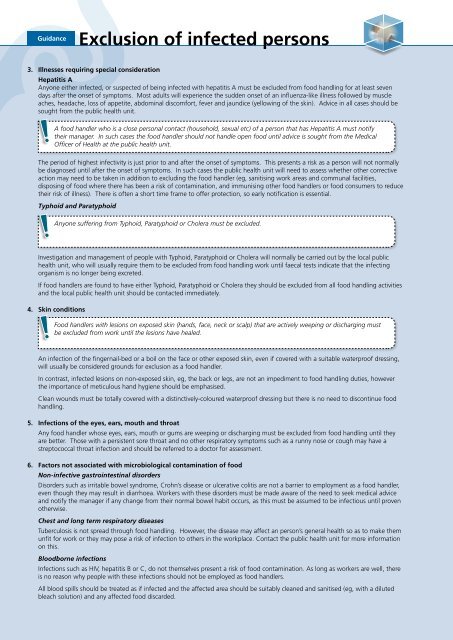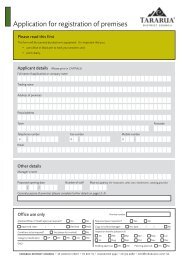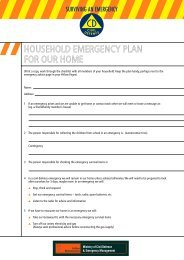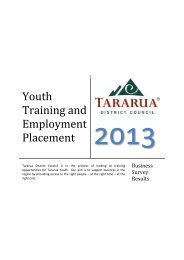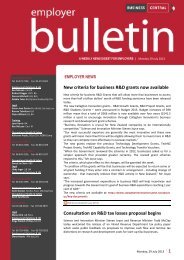Food Control Plan Checklist - Tararua District Council
Food Control Plan Checklist - Tararua District Council
Food Control Plan Checklist - Tararua District Council
- No tags were found...
You also want an ePaper? Increase the reach of your titles
YUMPU automatically turns print PDFs into web optimized ePapers that Google loves.
GuidanceExclusion of infected persons3. Illnesses requiring special considerationHepatitis AAnyone either infected, or suspected of being infected with hepatitis A must be excluded from food handling for at least sevendays after the onset of symptoms. Most adults will experience the sudden onset of an influenza-like illness followed by muscleaches, headache, loss of appetite, abdominal discomfort, fever and jaundice (yellowing of the skin). Advice in all cases should besought from the public health unit.A food handler who is a close personal contact (household, sexual etc) of a person that has Hepatitis A must notifytheir manager. In such cases the food handler should not handle open food until advice is sought from the MedicalOfficer of Health at the public health unit.The period of highest infectivity is just prior to and after the onset of symptoms. This presents a risk as a person will not normallybe diagnosed until after the onset of symptoms. In such cases the public health unit will need to assess whether other correctiveaction may need to be taken in addition to excluding the food handler (eg, sanitising work areas and communal facilities,disposing of food where there has been a risk of contamination, and immunising other food handlers or food consumers to reducetheir risk of illness). There is often a short time frame to offer protection, so early notification is essential.Typhoid and ParatyphoidAnyone suffering from Typhoid, Paratyphoid or Cholera must be excluded.Investigation and management of people with Typhoid, Paratyphoid or Cholera will normally be carried out by the local publichealth unit, who will usually require them to be excluded from food handling work until faecal tests indicate that the infectingorganism is no longer being excreted.If food handlers are found to have either Typhoid, Paratyphoid or Cholera they should be excluded from all food handling activitiesand the local public health unit should be contacted immediately.4. Skin conditions<strong>Food</strong> handlers with lesions on exposed skin (hands, face, neck or scalp) that are actively weeping or discharging mustbe excluded from work until the lesions have healed.An infection of the fingernail-bed or a boil on the face or other exposed skin, even if covered with a suitable waterproof dressing,will usually be considered grounds for exclusion as a food handler.In contrast, infected lesions on non-exposed skin, eg, the back or legs, are not an impediment to food handling duties, howeverthe importance of meticulous hand hygiene should be emphasised.Clean wounds must be totally covered with a distinctively-coloured waterproof dressing but there is no need to discontinue foodhandling.5. Infections of the eyes, ears, mouth and throatAny food handler whose eyes, ears, mouth or gums are weeping or discharging must be excluded from food handling until theyare better. Those with a persistent sore throat and no other respiratory symptoms such as a runny nose or cough may have astreptococcal throat infection and should be referred to a doctor for assessment.6. Factors not associated with microbiological contamination of foodNon-infective gastrointestinal disordersDisorders such as irritable bowel syndrome, Crohn’s disease or ulcerative colitis are not a barrier to employment as a food handler,even though they may result in diarrhoea. Workers with these disorders must be made aware of the need to seek medical adviceand notify the manager if any change from their normal bowel habit occurs, as this must be assumed to be infectious until provenotherwise.Chest and long term respiratory diseasesTuberculosis is not spread through food handling. However, the disease may affect an person’s general health so as to make themunfit for work or they may pose a risk of infection to others in the workplace. Contact the public health unit for more informationon this.Bloodborne infectionsInfections such as HIV, hepatitis B or C, do not themselves present a risk of food contamination. As long as workers are well, thereis no reason why people with these infections should not be employed as food handlers.All blood spills should be treated as if infected and the affected area should be suitably cleaned and sanitised (eg, with a dilutedbleach solution) and any affected food discarded.


